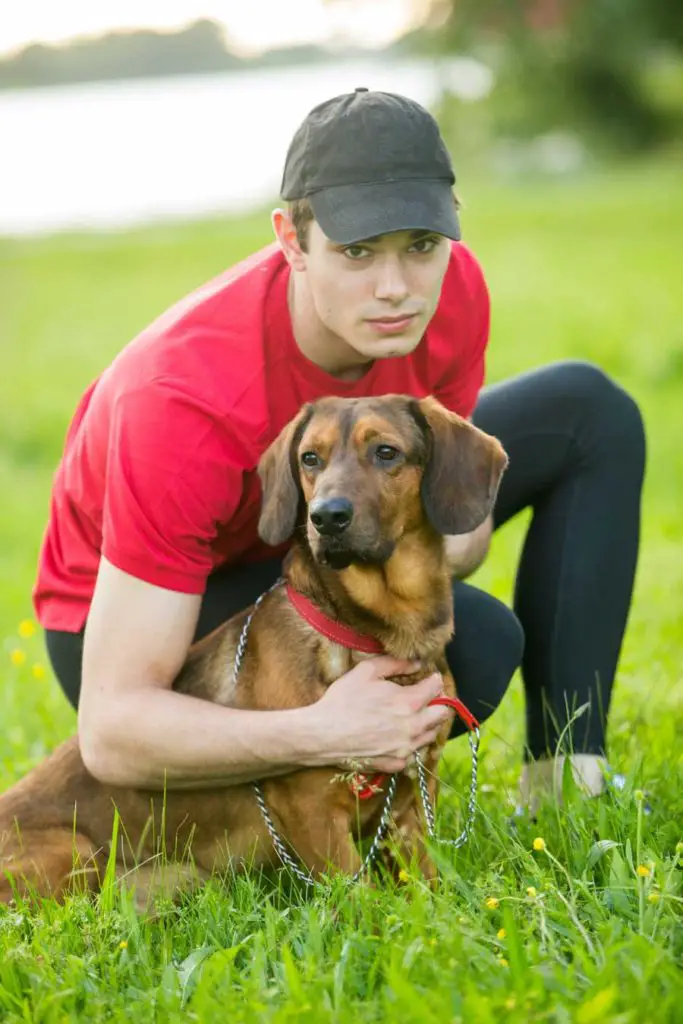Are Dachshunds Good Service Dogs? (Explained)
With so many dog breeds, Dachshunds stand out because of their body shape. Famously described as “a half-dog high and a dog-and-a-half long,” dachshunds, also known as sausage dogs, were originally bred to hunt badgers and small game. In fact, the name “dachshunds” is a combination of two words– Dachs to mean badger and hund to mean dog.
As small as they are, sausage dogs are the biggest in hunting spirit. But that isn’t all that is within their capability; these pooches are very intelligent, loyal, cute, interactive, and hypersensitive. But can they really make good service dogs? Well, we’ve got the answer to this common question!
Dachshunds have almost everything it takes to make good service dogs. Therefore, with a good trainer and some patience, you can turn your Dachshund into a reliable service dog just like the popular dog breeds known to excel in it.
What Are Service Dogs?
There is one character that makes dogs different from other beings, loyalty. That’s why they are commonly known as a ‘man’s best friend’. Service dogs are canines that have undergone training to perform different tasks for people living with disabilities.
They help the disabled develop independence and confidence by assisting them to do some work in their day-to-day life so that they don’t have to always rely on other people. This is the area where service dogs have been long thought to help.
However, as time goes by, the list of what service dogs can do has grown long to the extent that even people living without a disability or with an invisible disability also need their service in their everyday life.
What Makes An Elite Service Dog?
Scientists hold that the most intelligent dogs are as smart as a human aged between 2- 2.5 years old. Combining this mental ability with their great strength and special qualities, dogs can be very reliable human assistants when trained properly. Some dogs, however, have a greater potential of becoming better service dogs than others. So what exactly defines their potential?
Well, it all boils down to the dog’s personality. To become a successful service dog, there are several must-haves. For instance, the furry colleague needs to have high levels of confidence, calmness, and intelligence.
Confident dogs are willing to learn and take everyday challenges in their strides, making it easy to advance to higher levels of training without letting their slight mistakes of the past pin them down. Also, these dogs are trained to perform their work in public settings, something that all calls for confidence.
Calmness is another must-have personality for every service dog. A dog that is aggressive to humans or other things can be more of a liability to their human partner than it is of help. Calm demeanor also calls for dogs that do not tend to run or play during the inappropriate time.
Intelligence defines how easy the dog is to train. Although most dogs have high levels of intelligence, some are smarter than others, putting them at an upper hand of becoming better service dogs than others. Also, intelligence is necessary considering that they are being trained to act like humans under certain conditions.
Finally, to make a good service dog, a canine needs to be healthy since serving as one comes with the need to perform what they are trained to do daily.
Types of Service Dogs
We have different types of disabilities. In the same way, service dogs are individually trained to perform tasks that relate directly to a person’s specific disability. This gives birth to the following types.
Guide Dogs:
This class of canines is among the most common types of service dogs. As the name suggests, these dogs are trained to help the visually impaired or blind individuals navigate their environments. You will see most of these dogs on vests although the Americans with Disabilities Act doesn’t put this as a requirement.
Mobility Assistance Dogs:
These are canines trained to help people with mobility issues in performing different tasks. These dogs are trained to bring objects, operate switches, and perform a wide variety of tasks for people on wheelchairs.
Hearing Dogs:
This type of service dogs is helpful for people with hearing impairment. They are taught to hear on their behalf and act in a manner that conveys a message to their human partner. For instance, in case of a door alarm, a hearing dog will respond by touching the impaired person and leading them to the door.
Seizure Response Dogs (SRDs):
This type of service dogs is for people with epileptic seizures or any other seizure. They will respond to a seizure by barking, seeking for someone to help, and triggering a life-alert system. In case their human partner is in a dangerous place, these dogs will first act by taking them to a safe place. After the seizure, a seizure response dog will respond by bringing medication, phone, and other necessities immediately to the person.
Allergen/Allergy Detection Dogs:
These are dogs that are custom-trained to detect the presence of allergens in the environment. They are trained to serve people that are living with life-threatening allergies. These dogs work by sniffing for the presence of allergens on tables, seats, food, and other areas. In case they detect any of the harmful substances, these dogs will warn their partner that the place or food isn’t safe for them. Some people know them as Anaphylaxis Prevention Dogs while others prefer to call them Anaphylaxis Service Dogs.
Diabetic Alert Dogs (DADs):
Although it’s not possible for a typical human to detect any scent changes concerning low or high blood sugar levels, some dogs have a very strong sense of smell that can note these changes. When they sense any smell implying hyperglycemic or hypoglycemic condition, they will respond immediately by alerting the diabetic. This helps the person take the necessary measures before the situation gets dangerous.
Other Types of Service Dogs:
Other types of service dogs include Psychiatric service dogs for people suffering from depression and anxiety, Autism support dogs for juniors on autism spectrum, FASD service dogs for kids diagnosed with FASD, and other many types.

How Do You Know If You Need A Service Dog?
If you have any form of impairment, then it’s definite that you will find life to be easier with a service dog. The service dog you need should be trained to perform tasks that relate to areas are where you need intervention. For instance, if you are blind or have low vision, guide dogs are the way to go. Nevertheless, if you are one of the epileptic individuals, a seizure response dog is what works best for you–and so on.
However, gone are the days when service dogs were seen as only necessary for people living with disabilities. With the emergence of different types of these dogs, at least everyone needs a service dog at some point in their life. After all, who haven’t suffered anxiety or depression in their life? That aside, who wouldn’t enjoy the company of a dog who can turn into a lifesaver in case of danger?
Therefore, service dogs are good whether you have a physical disability, invisible disability, or no impairment at all. However, when using some working dogs such as emotional support and therapy support dogs, it’s important to note that they aren’t afforded the same privileges as the dogs made to serve people that are disabled. Therefore, they may not be let in some areas where pets are restricted.
What Makes Dachshunds Good Service Dogs?
If you ask most trainers, they will tell you that a dog’s potential to serve as a reliable service dog is not defined by their breed. Instead, the ability to excel in this area depends on the personality of the dog.
That said, a dachshund can make a very good service dog just like any other breed provided that they possess all the necessary qualities and have a good trainer. In fact, as proof that you can convert your dachshund to a fantastic service dog, we have many dog folks who have already succeeded in this.
However, most Dachshunds tend to be a bit stubborn than some of the breeds. This major trait makes them quite hard to train. However, provided that the trainer combines effort, patience, and expertise, it’s possible to get an elite service dog from your Wiener dog.
What Type of Service Dogs Suits Dachshunds?
The natural traits of Wiener dogs make them more suitable for some areas of support than others. For instance, since they have a short stature, training these adorable canines to play the role of ‘seeing dogs’ may not be the wisest thing. Also, because they are small, sausage dogs are limited naturally to serving in roles that require large and stronger dogs. An example of these areas includes those that require offering physical support.
However, dachshunds have some traits that put them in a better position of making better service dogs in certain service areas than other breeds. For instance, since they are hyper-sensitive than the majority of the breeds, these short furry colleagues can make good hearing dogs. Also, they will work well as seizure response dogs.
How Do You Get Your Dachshund Trained?
Some organizations specialize in dog training. Unfortunately, everyone can’t get dogs from these organizations. However, training your own Dachshund to become a service dog is a sure way of enjoying this whole new level of man-dog relationship.
Before you hire training services, however, it’s wise to begin by first assessing the dog’s age and health condition. The dog should be past the puppy stagy, healthy, and should possess all the qualities necessary to make a good service dog. On health, hiring the services of a vet will be wise since they are in a better position to diagnose any mild conditions that may affect the trainability.
If your Dachshund dog passes this evaluation, it’s time to identify a reputable dog trainer. Some charge better than others and a few have friendlier terms to an extent that they are willing to conduct the training in your home.
Do You Need To Acquire A Certificate For Your Dachshund Service Dog?
Registering your dog is not a legal requirement, thanks to the American with Disabilities Act (ADA, 1990). This Act provides a guideline of questions that you are expected to answer. These questions touch on your disability and the type of service dog.
However, there is no point in time when you should be expected to produce a certificate of registration for your service dog. Nevertheless, since not all business owners and landlords are aware of this, registration is at times good for earning the respect of your closest four-pawed colleague. Luckily, there are many registration organizations available depending on the nature of your disability. Most of these organizations will require your name, dogs name, contact information, type of service dog, and a small fee.
What other breeds make good service dogs?
As aforementioned, a dog’s breed doesn’t have much to do with its ability to serve as a service dog. However, some breeds have more favorable traits for better service dogs than others.
These breeds include Labrador retriever, German shepherd, Golden retriever, Poodle, Pitbull, and others. Generally, large and strong dogs are at the upper hand of working as better service dogs since they provide the added advantage of performing more physical tasks than what the smaller breeds can manage.







